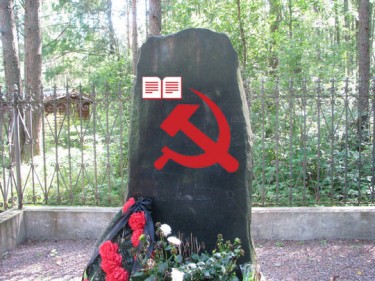On June 12, 2012, Moldova’s parliament condemned [1] [ro] the Soviet totalitarian communist regime and prohibited the use of the communist symbols, the hammer and sickle [2]. This move is long overdue, as it comes more than 20 years after Moldova gained independence in 1991. The society is still divided on the issue, however – which is not surprising, considering that between 2001-2009 the country was governed by an overwhelming Communist majority, which lured its electorate with nostalgic Soviet symbols.
Online reactions to the verdict of the Moldovan parliament vary significantly.
Eugeniu Luchianiuc

Collage by Eugeniu Luchianiuc, used with permission
Tudor Cojocariu writes [4] [ro]:
From the present we landed in the past, from 2012 back to the 1990s, when all the civilized states started the process of condemning communism, and some even finished it, with lustration, punishment for the criminals and rewards for the heroes.
Bogdan Țîrdea has several questions [5] [ro] and doubts regarding this:
Why is there an interest in prohibiting the communist symbols that belong to the biggest opposition party? Isn’t that a simple political revenge? And isn’t destroying the opposition in itself an example of totalitarianism, intolerance, censorship on the freedom of thinking and expression?
On the other side, Radu Vodă is happy with the parliament’s ruling. He hopes [6] [ro] that,
[…] this day would become an awakening for the conscience of many people who had made a habit out of communist lies, even a pact with the devil. […] For me, knowing the suffering of my parents, this day is a celebration for my soul.
Vitalie Cojocari asked this question [7] [ro] in his blog title: “Who will purge Lenin statues from the heads of the Moldovans?”
He believes that the parliament's decision has been implemented overnight and therefore can have unexpected consequences:
Making illegal the communist symbols represents the beginning, not the end, of the “anticommunist war.” I do not know whether the politicians from Chişinău realize it, but the vote in the parliament has practically opened a Moldovan Pandora's box. Today no one can tell what will happen in Moldova. Where will giving up the hammer and sickle lead to? How will this historical decision manifest itself in the society? And this due to two reasons: first, because the Moldovans have a kind of a nostalgic affection towards the communist symbols; second, everything came unprepared, without prior information, without a large public debate and, very importantly, without an explanation to the masses what these communist symbols mean and meant to the little Moldova.
In the same line of thought, Octavian Racu wonders whether the communism story has come to an end with the parliament's decision. He asks [8] [ro]:
Has anyone wondered why no one is interested in revealing the people who committed serious crimes against humanity during the communist rule? Why was it impossible for the [Law on lustration [9]] to be adopted by any of the parliaments since 1990 onwards?
He went on saying this:
It could very well be that while the parliamentarians were condemning the communist regime, a criminal who had organized [the deportations [10]] and hunger was staying peacefully at home in front of the TV, with a beer in his hand and laughing underneath his moustache, with a medal for “outstanding merits” on his chest, as well as a fat pension. And he is completely happy about “condemning communism” because it does not target or affect him.
Aurelian Lavric warns [11] [ro] that by adopting such a politically driven decision, the gap within the society has deepened. According to him, the Soviet communist crimes will be eternally condemned only when those in power stop using the totalitarian practices and when the Parliament is formed by the people who were not raised during the Soviet totalitarian regime.
Vitalie Vovc regrets [12] [ro] that Moldova has not managed to build a healthy nation during its 20 years of independence:
With the general disaster in the background, yesterday’s decision of the Parliament, which would definitely have been welcomed enthusiastically 20 years ago, now can only cause a sad, ironic smile. Twenty years ago we were poor, but healthy, mentally and physically. Today we are poor and… rotten… Being eaten by the decay… […] In the past 20 years we have raised a generation that knows little besides the anti/pro communist bayonet. What will they do now? With whom will they fight?